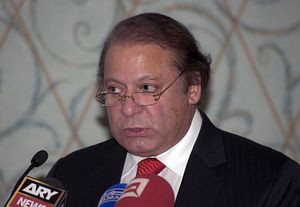Since the Panama Papers leaks, Pakistani Prime Minister Nawaz Sharif has twice addressed the nation. In his first address, the prime minister’s tone was defensive, as he insisted he was guilty of no legal wrongdoing. In his second speech, by contrast, his body language was aggressive as he called on the incumbent chief justice to head a commission of inquiry. Notwithstanding Sharif’s Panama Papers predicament, those who believe his fall from the pinnacle will free Pakistan from corruption need a refresher course in the country’s politics.
Corruption is institutional in Pakistan, from top to bottom. Firing corrupt individuals alone is not going to fix this complex issue overnight. That kind of heavy-handed approach will only push the corrupt practices ingrained in the system underground, from which they will later re-emerge. Moreover, this kind of approach can only be applied to the top tier.
To effectively tackle corruption, a comprehensive national-level anti-corruption policy is needed. It should provide short-, medium- and long-term measures while proposing reforms in the system. At the middle and lower tiers, corruption is driven more by compulsion than by lust or avarice. Without promoting a meritocracy and culture of specialization, ending political meddling in different government institutions, incentivizing honest conduct, and revising the salary packages of cadres, eliminating corruption at this level will remain a pipe dream.
German Philosopher Nietzsche said, “Whoever fights monsters should see to it that in the process he does not become a monster.” This is entirely apt in the post-Panama Papers predatory political environment in Pakistan. In their overdrive, the self-appointed anti-corruption crusaders in Pakistan are over-stretching the system beyond its limits and elasticity. Conceptually, anti-corruption camping should contribute to corruption-cleansing that should ultimately strengthen the system rather than weakening it. Given Pakistan’s polarized political environment, undue haste to fix the problem will lead to unnecessary destabilization of the system, but delaying tactics or manipulation by the government will also create complications.
The anti-corruption campaign in Pakistan should not be done in a way that pits one state institution against the other in a bid to gain the high moral ground. If the anti-corruption campaign becomes a competition among state institutions – which is less corrupt and more accountable than others – then accountability will be in name only. It is also of paramount importance to consider who will do this challenging job and under what constitutional authority and legal powers. Sharif’s request to the chief justice to head the inquiry commission to examine the allegations emerging from the Panama Papers is a welcome step. The National Accountability Bureau (NAB) in its current configuration is ill-suited for the job.
In the wake of the Panama Papers, Pakistan’s fragile political system, which is trying to recover from multiple internal and external challenges, requires deft and careful handling. An overzealous crusade to quick-fix the problem of corruption might provide some short-term results but it will compromise the long-term prospects.
A case in point is former Chief Justice Iftikhar Muhammad Chaudhry’s decision-making approach since his reinstatement in 2009 following the historic lawyer’s movement. His warrior-like approach and desire to act as the lone-savior of the system turned a historic opportunity to reform Pakistan’s slow-performing judicial system into a moment of short-lived personal glory.
Undoubtedly, in Chaudhry’s tenure, Pakistan’s superior judiciary took some bold and historic decisions. His Suo Motu notices, on almost everything, became the stuff of legend. However, the desire for quick fixes within the complicated context of the body politic of Pakistan led Chaudhry to overstep his authority on numerous occasions, creating confusion and panic in other state organs that in turn produced policy inertia and a reluctance to perform even routine duties efficiently. Chaudhry pandered to populist demands and squandered the opportunity. Consequently, the changes at the highest levels of the judiciary did not trickle down to the lower judiciary, where the general public continues to face the same hardships it faced before the lawyer’s movement.
The Panama Papers are here to stay. The government can only fight a delaying action by dragging its feet on the issue or trying to manipulate an independent probe. The government’s botched efforts to turn the issue into a blame-game match through a counter-offensive against its political rivals have cut no ice with the media, civil society, or public. So, rather than turning an anti-corruption campaign into a mudslinging match or muscle-flexing exercise, the upper echelons of power in Pakistan need to come together and address the issues rationally and dispassionately. As long as the accountability of politicians will continue to create political martyrs and questions about the military’s accountability amount to sedition, the dream of a corruption-free Pakistan will remain elusive.
Somewhere along the line, Pakistan also needs truth and reconciliation to move forward. In the absence of this, the ghosts of the past will continue to haunt the country. Nietzsche also said, “And if thou gaze long into an abyss, the abyss will also gaze into thee.”
Moreover, Pakistan cannot afford any misadventures at this critical juncture when democracy is beginning to take root and the system is maturing slowly. The decision of the army chief to act alone by firing 12 army officers and put the country’s political leadership on the spot has politicized an issue, which is the wrong start to a right thing. But then perhaps Pakistan is the only country where the right things are done the wrong way.
The author is an Associate Research Fellow at the International Center for Political Violence and Terrorism Research (ICPVTR) of the S. Rajaratnam School of International Studies (RSIS), Singapore. He can be reached at [email protected]
































